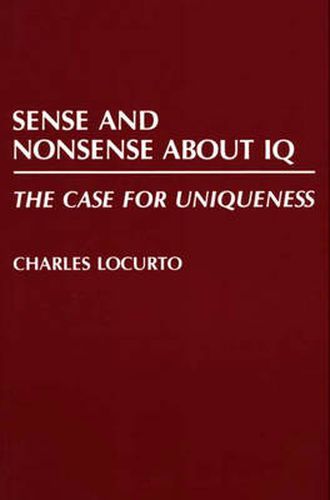Readings Newsletter
Become a Readings Member to make your shopping experience even easier.
Sign in or sign up for free!
You’re not far away from qualifying for FREE standard shipping within Australia
You’ve qualified for FREE standard shipping within Australia
The cart is loading…






This fascinating, well-written, and potentially controversial book is a wide-ranging exploration of the essential issues relevant to IQ. Charles Locurto examines data on the effectiveness of preschools; the impacts of adoption, heredity, and the role of environment; he evaluates the possibility of enhancing IQ in the early years; and he brilliantly describes and analyzes the major cases relevant to IQ research. Sense and Nonsense about IQ is truly an excellent sourcebook on the subject of human intelligence and its measurement.
Locurto reaches conclusions about the benefits of preschools, adoptions, social class, and family events that will gain attention and evoke discussion. The balance of the work, neither identifying with those who follow the extremes of hereditarianism or of environmentalism, ensures that Locurto’s volume will be a most valuable resource for all with a serious interest in this subject which has so many far-reaching implications.
$9.00 standard shipping within Australia
FREE standard shipping within Australia for orders over $100.00
Express & International shipping calculated at checkout
This fascinating, well-written, and potentially controversial book is a wide-ranging exploration of the essential issues relevant to IQ. Charles Locurto examines data on the effectiveness of preschools; the impacts of adoption, heredity, and the role of environment; he evaluates the possibility of enhancing IQ in the early years; and he brilliantly describes and analyzes the major cases relevant to IQ research. Sense and Nonsense about IQ is truly an excellent sourcebook on the subject of human intelligence and its measurement.
Locurto reaches conclusions about the benefits of preschools, adoptions, social class, and family events that will gain attention and evoke discussion. The balance of the work, neither identifying with those who follow the extremes of hereditarianism or of environmentalism, ensures that Locurto’s volume will be a most valuable resource for all with a serious interest in this subject which has so many far-reaching implications.